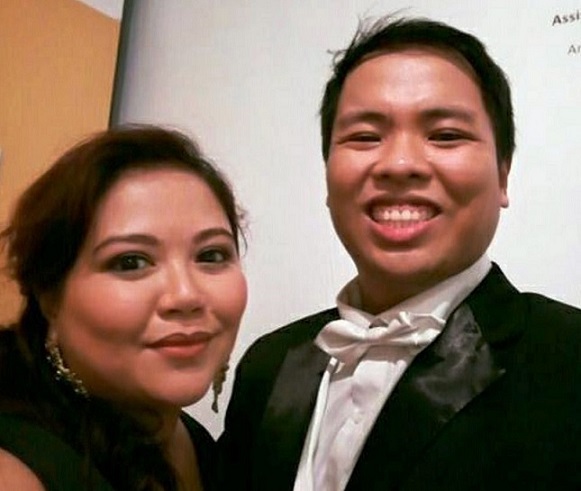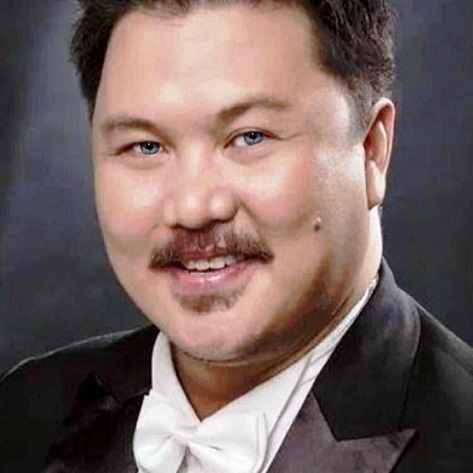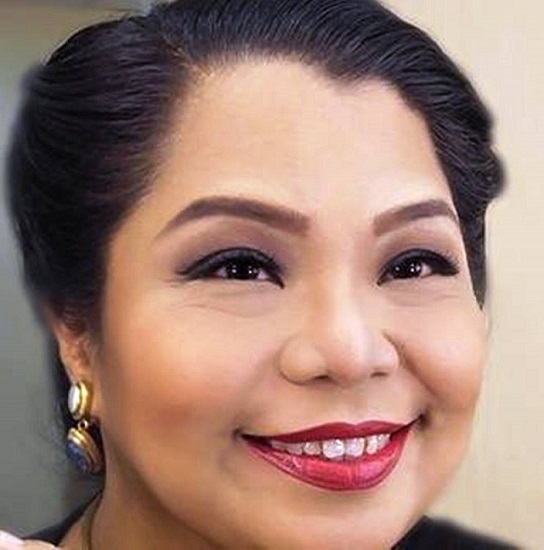When Verdi composed La Traviata (The Fallen One), he was moving away from traditional subjects of opera like stories from The Bible or historical dramas. In his ground-breaking work that met with a lot of resistance from the initial audiences, he tackled prostitution, disease and human passion.
Traviata gets tweaked by musical director Camille Lopez Molina in the Cultural Arts Event Organizer’s chamber version set for a one-night performance on Oct. 26 at 6:30 p.m. at the Ayala Museum in Makati City.
 Soprano Anna Migallos and tenor Nomher Nival
Soprano Anna Migallos and tenor Nomher Nival
Soprano Anna Migallos, who plays Violetta Valery, a popular courtesan, said her teacher Lopez Molina chose the opera “because it’s beautiful music. We wanted to work on and perform such beautiful music. Every time we work on the Act Two scene of Giorgio Germont (Alfredo’s father) and Violetta, we can’t help but stifle a cry. The music is that moving. Things came together in terms of having the singers for the roles all available and willing to work on the project. But really, how can any of us pass up on the chance to sing Traviata?”
According to bass-baritone Noel Azcona (in the role of Giorgio Germont), the last time Traviata was mounted was in March 2012 at the Cultural Center of the Philippines. In the cast were Arthur Espiritu, Rachelle Gerodias and Andrew Fernando. It was a collaboration between the CCP and the Daegu Opera Company. The Korean cast was made of Yun Kyoung Yi as Violetta, Jae Wook Lee as Alfredo and Daesan Noh as Germont. Floy Quintos served as director. Jae Joon Lee conducted the Philippine Philharmonic Orchestra.
Migallos listed the famous arias from the opera: “In Act One, there’s ‘E strano…ah forse lui…sempre libera.’ The beginning of the aria is slow, pensive. When ‘Sempre libera’ begins, it becomes vocal fireworks. Her next aria, ‘Addio del passato’ comes in Act Three. Here she waits for Alfredo to come back to her, but she is dying and she knows she has little time left. In this aria she says goodbye to her happy past and to the love she and Alfredo had.”
Tenor Nomher Nival, who plays Alfredo Germont, added other arias: Alfredo’s aria in Act Two—the recitative ‘Lunge da lei,’ ‘De miei bollenti,’ ‘O mio rimorso,’ and Giorgio’s aria in Act Two, ‘Di Provenza il mar.”
 Bass- baritone Noel Azcona
Bass- baritone Noel Azcona
He said the challenge of his role is to have a good tenor voice with tenderness and “someone who can still sing with ease despite the drama required.”
Nival found relevance in the opera’s story, saying, “With all the things happening in our time, people might actually be too fed up with reality and would rather see hope in a tragic story.”
For Violetta, Migallos said, “A lot of stamina is required. It’s a heavy and dramatic role with barely a moment’s rest so I have to be physically strong and smart about how I pace myself throughout. I have to know where to give one hundred percent and where to give sixty percent. Violetta is vocally challenging. She has this fun showpiece coloratura aria in Act One with high Cs, Ds, then an E flat at the end. By fun, I mean fun to listen to, not to sing! It’s fun once you get to know it and you’re able to play with it as a singer, but the birth pains are painful! After that aria, the rest of it is dramatic. A lot of her music sits low.”
She was invited recently to perform in Indonesia. She recalled, “I was asked to sing with the Nusantara Symphony Orchestra for their opera gala. I sang Violetta’s Act I aria, ‘Sempre libera’, and ‘Song to the Moon’ from Dvorak’s Rusalka, then I did the duet ‘Lippen Schweigen’ from The Merry Widow by Lehar with an Indonesian baritone. I did the duet ‘Mira o Norma’ from Norma by Bellini with an Indonesian soprano. It was my second time to sing with the orchestra, but this time I worked with guest conductor Richard Nordling.”
 Music director Camille Lopez Molina
Music director Camille Lopez Molina
CAEO associate producer Joseph Uy said about opera’s future in the country: “The Philippines has many good singers. If we can only have the support to maintain a regular opera company, I can assure you in ten years’ time, we can produce a company at par with any American regional opera house and in 20 years, we can be at par with some of the world’s best opera houses.”
He continued, “To maintain the love for opera, we must start doing outreach program with a lot of explaining to the younger generation. We must do a lot of pocket classical concerts in public places like malls. Education is the key to sustain not only opera but art itself.”
He described opera as “the most complete of all art forms and the only art form that imitates life. Vocal concerts captivate the audience more than instrumental ones. It is natural for humans to love voices. For opera to survive in the country, you need to produce topnotch productions, not lavish or expensive ones but a production that will penetrate the heart of the audience. Opera has been stigmatized as an art form for the elite. There’s some truth in it because of expensive tickets. But with support from the government or private companies, we can lower ticket prices. It takes only one good opera to mesmerize a music lover and turn him into an opera fanatic.”
For tickets, call Ticketworld at 891-9999 or CAEO, 782-7164, 0918-347-3027 and 0920-954-0053.

